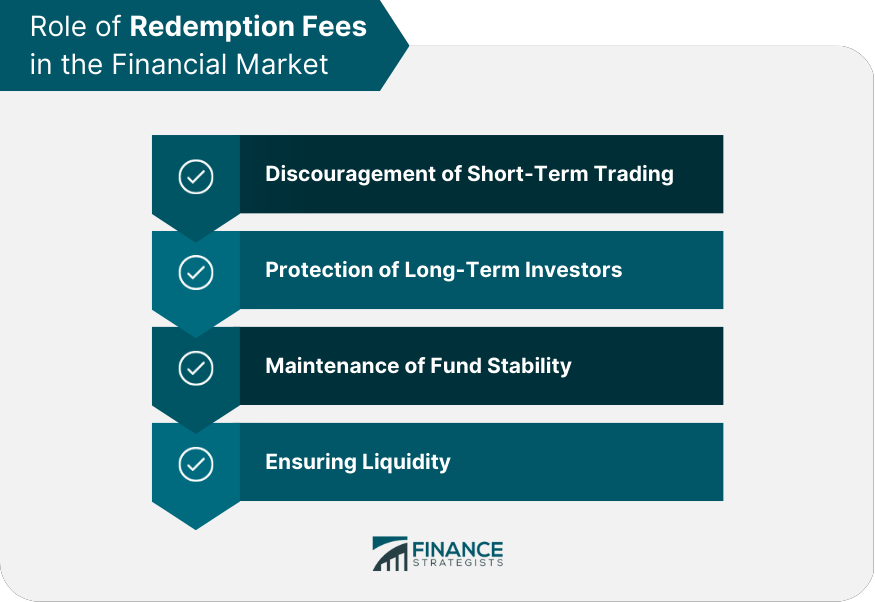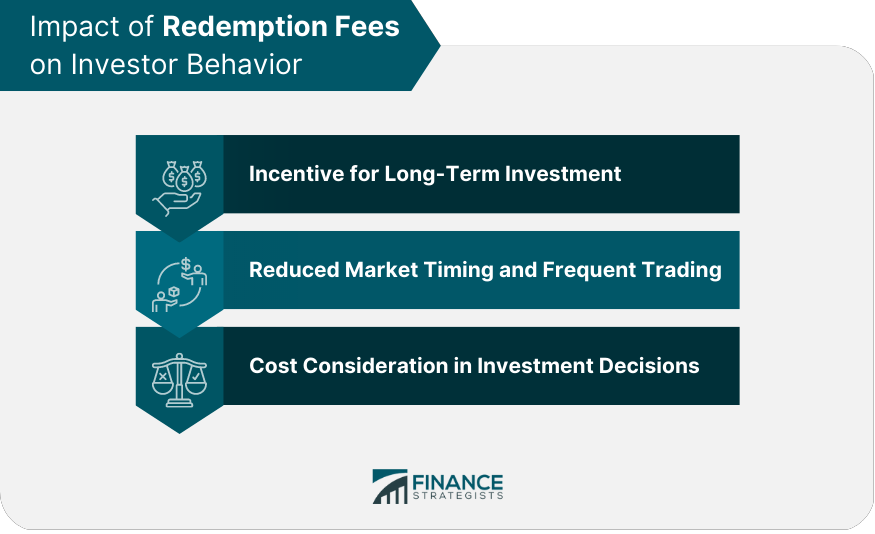Redemption fees are charges imposed on investors when they sell or redeem shares of a mutual fund, hedge fund, or other types of investment funds within a specified time frame. These fees are designed to discourage short-term trading and protect the interests of long-term investors. The primary purpose of redemption fees is to discourage market timing and excessive trading, which can negatively affect a fund's performance and the interests of long-term investors. Additionally, these fees help maintain fund stability and ensure liquidity by covering the costs associated with frequent transactions. Redemption fees can be applied to various types of financial assets, including mutual funds, hedge funds, and other pooled investment vehicles. The specific terms and conditions of redemption fees may vary depending on the fund and its objectives. Redemption fees serve as a deterrent for short-term trading by imposing a cost on investors who sell or redeem their shares within a specified time frame, typically a few months to a year. This encourages investors to hold their investments for more extended periods and promotes long-term investment strategies. By discouraging short-term trading, redemption fees help protect the interests of long-term investors. Frequent trading can create volatility and increase transaction costs, which can negatively impact a fund's performance and the returns of long-term investors. Frequent trading can lead to fluctuations in a fund's asset base, making it challenging to manage and maintain stability. Redemption fees help to minimize these fluctuations by discouraging short-term trading, which contributes to a more stable fund. Redemption fees can help ensure liquidity for a fund by covering the costs associated with frequent transactions. These fees are typically paid back into the fund, which helps maintain its liquidity and meet the redemption requests of investors. The fee percentage is the amount charged on the total value of the shares being redeemed. This percentage can vary depending on the fund and its objectives, but it typically ranges up to a maximum of 2% of the redeemed amount. The holding period is the minimum duration an investor must hold shares before they can sell or redeem them without incurring a redemption fee. This period can vary between funds and typically ranges from a few months to a year. There are two primary methods for applying redemption fees: flat rate and sliding scale. A flat-rate redemption fee applies the same percentage to all redemptions within the specified holding period, regardless of the length of time the shares were held. A sliding scale redemption fee adjusts the fee percentage based on the length of time the shares were held. The fee percentage decreases as the holding period increases, eventually reaching zero when the minimum holding period is met. Fund managers are required to disclose redemption fees in the fund's prospectus, as well as in other relevant documents provided to investors. This disclosure ensures that investors are aware of the fees and their implications before making an investment decision. Redemption fees provide an incentive for investors to adopt a long-term investment strategy by penalizing short-term trading. This encourages investors to focus on the long-term performance of the fund and make investment decisions based on fundamentals rather than short-term market fluctuations. By imposing a cost on short-term trading, redemption fees discourage market timing and frequent trading, which can negatively impact a fund's performance and long-term investors' returns. This reduces the likelihood of investors trying to exploit short-term market movements and helps maintain a more stable investment environment. Redemption fees encourage investors to factor in the potential costs of their investment decisions, particularly when considering short-term trades. This heightened awareness of costs can lead to more informed investment decisions and a greater focus on long-term investment strategies. Critics argue that redemption fees create a barrier to entry in the financial market by imposing costs on investors, particularly those with a short-term investment horizon. They believe that these fees can discourage investment and limit market efficiency. Some critics question the effectiveness of redemption fees in preventing market timing, suggesting that determined market timers may still find ways to exploit short-term market fluctuations despite the fees. Redemption fees can have unintended consequences for certain investors, particularly those who need to access their investments in a shorter timeframe due to unforeseen circumstances. These investors may be forced to pay redemption fees even if they had no intention of engaging in short-term trading. The SEC regulates redemption fees in the United States and provides guidelines for fund managers to follow when implementing and disclosing these fees. This ensures that investors have access to accurate and transparent information about redemption fees and their implications. FINRA, a self-regulatory organization in the United States, also provides rules and guidelines related to redemption fees. These rules are designed to ensure that fund managers comply with regulatory requirements and protect investor interests. Regulatory bodies in other countries may also have guidelines and regulations related to redemption fees. These may vary depending on the jurisdiction, but the overarching goal is to protect investor interests and promote transparency in the financial market. ETFs are a popular alternative to mutual funds with redemption fees, as they are traded on stock exchanges and do not typically impose redemption fees. Investors can buy and sell ETFs throughout the trading day, providing flexibility and ease of access. No-load mutual funds do not charge any fees for buying or selling shares. These funds can be an attractive option for investors seeking to avoid redemption fees, though they may have other fees and expenses. Index funds aim to replicate the performance of a specific market index, such as the S&P 500. These funds often have lower fees and expenses than actively managed funds, including lower or no redemption fees, making them an attractive option for cost-conscious investors. Understanding redemption fees and their implications is essential for investors when selecting investment funds. These fees can influence investment decisions and impact overall returns, particularly for short-term traders. Redemption fees serve a vital purpose in protecting the interests of long-term investors and maintaining fund stability. However, it is essential to strike a balance between investor protection and market efficiency to ensure that the financial market remains accessible and attractive to a diverse range of investors. The debate surrounding redemption fees and their effectiveness is ongoing, and regulatory bodies continue to assess the best approach to protecting investor interests while promoting market efficiency. As the financial market evolves, it is possible that redemption fees may be subject to further review and potential changes in the future.What Are Redemption Fees?
Role of Redemption Fees in the Financial Market
Discouragement of Short-Term Trading
Protection of Long-Term Investors
Maintenance of Fund Stability
Ensuring Liquidity

Calculation and Implementation of Redemption Fees
Fee Percentage
Holding Period
Fee Application Method
Flat Rate
Sliding Scale
Fee Disclosure in Prospectus and Other Documents
Impact of Redemption Fees on Investor Behavior
Incentive for Long-Term Investment
Reduced Market Timing and Frequent Trading
Cost Consideration in Investment Decisions

Controversies and Criticisms
Argument Against Redemption Fees as a Market Barrier
Perceived Ineffectiveness in Preventing Market Timing
Unintended Consequences for Certain Investors
Regulatory Environment and Guidelines
Securities and Exchange Commission (SEC) Regulations
Financial Industry Regulatory Authority (FINRA) Rules
International Regulations and Standards
Alternatives to Redemption Fees
Exchange-Traded Funds (ETFs)
No-Load Mutual Funds
Index Funds
Conclusion
Importance of Understanding Redemption Fees for Investors
Balancing Investor Protection and Market Efficiency
Ongoing Debate and Potential Future Developments
Redemption Fees FAQs
A redemption fee is a fee charged by mutual funds or exchange-traded funds (ETFs) when an investor sells or redeems their shares within a certain timeframe, typically ranging from 30 to 90 days.
Funds charge redemption fees to discourage short-term trading and protect long-term investors. Short-term trading can be disruptive to a fund's investment strategy and can result in increased transaction costs and lower returns for all investors.
The amount of a redemption fee varies by fund and can range from a few tenths of a percent to several percent of the value of the shares being redeemed. The fee is typically disclosed in the fund's prospectus.
No, not all funds charge redemption fees. It is up to the fund manager to decide whether or not to impose a redemption fee.
Redemption fees can be waived under certain circumstances, such as if the investor is redeeming shares due to the death or disability of the account owner, or if the redemption is part of a systematic withdrawal plan that was established before the fee was imposed. Some funds also waive redemption fees for investors who hold their shares for a certain period of time.
True Tamplin is a published author, public speaker, CEO of UpDigital, and founder of Finance Strategists.
True is a Certified Educator in Personal Finance (CEPF®), author of The Handy Financial Ratios Guide, a member of the Society for Advancing Business Editing and Writing, contributes to his financial education site, Finance Strategists, and has spoken to various financial communities such as the CFA Institute, as well as university students like his Alma mater, Biola University, where he received a bachelor of science in business and data analytics.
To learn more about True, visit his personal website or view his author profiles on Amazon, Nasdaq and Forbes.















